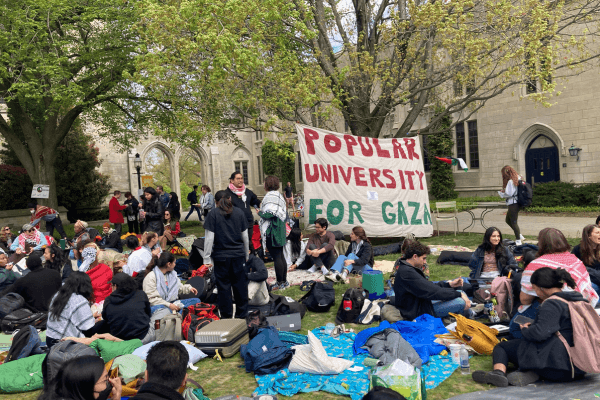During September’s session of the UN General Assembly, South Korean President Moon Jae-in delivered a speech of praise for the progress made between the South and North Korean governments in the past year and a half. He also articulated constructive plans for the prospect of peace between the fragmented halves.
He saw President Donald Trump’s visit to the North earlier this year as a monumental and historical step into the “new era of peace,” as the visit was a first by a sitting U.S. president. Moon hopes that more significant gestures between Trump and North Korean leader Kim Jong Un could lead to a long-awaited end of the Korean War. In the past, it took gunfire to incite eminent political disruption. But today, the space to negotiate peace on the peninsula remains accessible as both Koreas and the United States are not only aiming for peace and denuclearization, but on genuine economic cooperation.
However, tensions are rising again now that North Korea has reportedly resumed testing an engine with capabilities to propel an intercontinental ballistic missile bearing a nuclear warhead — with the U.S. as its target. This change seems to have also arrived with the return of Kim’s offensive rhetoric and toughening insistence that the U.S. comply with his terms by the end of the year. North Korean Vice Foreign Minister Ri Thae Song stated, “[It is] entirely up to the U.S. what Christmas gift it will select to get.”
The rhetoric on the American side is also far from amenable, as Trump has quickly returned to his familiar language, referring to Kim as a “rocket man” on a “suicide mission,” despite his claims that they share a “special relationship.”
Kim and Trump have had a fluctuating relationship, but with these most recent interactions, they are returning to the harshly confrontational language of 2017.
Now more than ever we need to cling onto the promise of Moon’s intention to generate a “peace economy,” whereby peace and economic partnership can feed into one another to reinforce a mutual alliance. Ultimately, peace on the Korean Peninsula is a promise that inextricably allies all the world’s nations together.
South Korea holds an active role in promoting peace and security, as the Republic is a key facilitator in discussions of denuclearization. The starting point of these negotiations should be to dismantle Yongbyon’s nuclear facilities with the coinciding measures of easing or lifting sanctions — as discussed at the Hanoi Summit.
Moon also discussed three principles for a permanent, lasting, and sustainable peace:
(1) The policy of zero tolerance for war. Korea remains in a stage of armistice, and there must be an end to the long-running armistice in favor of an absolute closing to the war.
(2) The mutual guarantee of security. South Korea must guarantee the security for the North and find equal reciprocation. With this assurance, denuclearization and the establishment of a peace regime on the peninsula will become possible. The international community is integral to this process.
(3) The co-prosperity of the nations. Genuine peace is not the absence of conflict, but the enrichment of mutual inclusivity and interdependence. A peace economy that includes and supports both Koreas will consolidate peace for them while furthering economic development.
It cannot be stressed enough how important the ROK-U.S. Alliance is in this peace endeavor. The alliance has been the linchpin of stability on the Korean Peninsula for 66 years and counting.
Now, the end of nearly 70 years of conflict-filled hostility and unspeakable loss must be finalized with the establishment of a permanent peace regime on the Korean Peninsula. A peace treaty will mark the endless efforts to gain peaceful coexistence and equality based on unified compassion for humanity. With the support and combined efforts of the international community, this long-standing hope can ultimately become a reality.
Got something to say about what you're reading? We value your feedback!








